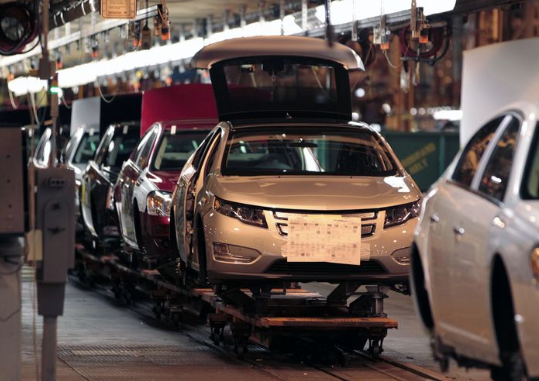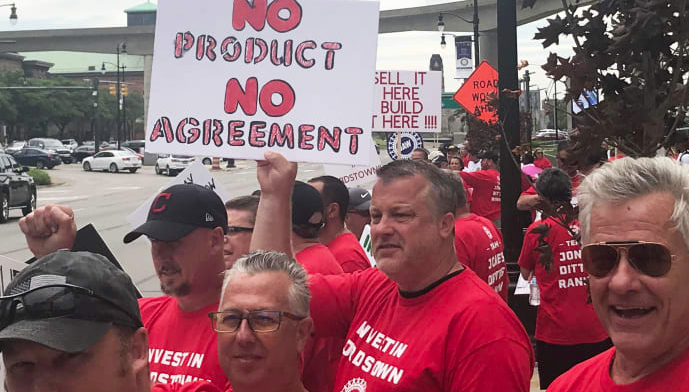The Risk Of A Strike At GM Just Hit A 12 Year High At The Worst Possible Time
The global auto industry is undoubtedly in the midst of a worldwide recession, the latest example of which we just highlighted out of China. Compounding the U.S./China trade war issue is the fact that consumers globally are, for lack of a better word, mired in debt and simply broke.
Which is why a strike at General Motors this month could truly be Murphy's Law in practice: the worst possible outcome, at the worst possible time.
And a strike seems more possible now than ever. We reported days ago that the UAW had authorized its leaders to strike and now the chance of a strike is at a "12-year high", according to Bloomberg. Union leaders will be in Detroit this weekend to determine whether or not they will take a proposed labor contract from GM back to their members for a vote, or if they will strike.

There's now "even odds" that GM will see its first walkout in 12 years.
Over the course of the last four years, GM has delivered its "best ever" profits while consumers bought record numbers of new vehicles. This, in addition to rhetoric from President Trump, has emboldened the UAW to ask for a greater share of the spoils and ask for a guarantee of work in at least one of the four U.S. plants GM marked for closure last November. GM is bracing for an economic downturn, which is likely going to make the negotiations contentious, as we pointed out in our last article.
President Trump had previously asked GM CEO Mary Barra to either re-open or sell the company's Lordstown, Ohio plant.
Kristen Dziczek, vice president of the industry and labor economics group at the Center for Automotive Research commented: “It’s just difficult to see how both sides can come to an agreement. Union membership expectations are very high given how well GM has been performing.”

She thinks there is a "greater than 50% likelihood" of a strike and a production halt that could last several weeks. On the other hand, Brian Rothenberg, a UAW spokesman, said it’s premature to speculate about whether or not a strike is possible.
Last Tuesday, the union announced that roughly 96.4% of GM members supported the authorization to strike. The UAW's last strike at GM took place in 2007 and lasted just two days. UAW President Gary Jones called the authorization a "key tool in the toolbelt as our bargaining team sits across from the company."
Among the points that the UAW are set to address during negotiations are:
- limiting the number of temporary workers GM is allowed to use
- giving new hires a quicker route to making senior-level wages of more than $30 an hour
- securing work for some of the plants in Michigan, Ohio, and Maryland that GM hasn’t allocated future product to
- securing a cost of living allowance that would help offset inflation
- GM's decision to idle the Chevy Cruze compact car plant in Lordstown, Ohio
- GM's decision to schedule end of production for January at a factory in Hamtramck, near Detroit

The problem for GM is that last year, the company had about 1 million vehicles worth of U.S. production capacity that wasn't used. Ron Harbour, a senior partner for consultant Oliver Wyman, says more capacity is going to need to be cut unless the company can improve sales or add new models.
During negotiations, GM will seek the use of more temporary workers. About 7% of GM's union staff are temporary workers that the company can dismiss easier than full-time workers. Temporary workers get paid as little as $15 per hour, which is about half of the wage of the company's senior factory workers.
Negotiations have been further complicated by a federal probe into union corruption that resulted in UAW President Gary Jones' home being searched two weeks ago by federal officials.

The probe has already resulted in convictions of eight union and company officials associated with Fiat. Charges were also filed against Michael Grimes, a former UAW official that was assigned to GM's department and who allegedly took $2 million in kickbacks from UAW vendors. Jones has not been charged.
Harley Shaiken, a labor relations professor at the University of California at Berkeley said of the corruption charges: “Many members are angry and turned-off. It adds to an already difficult set of negotiations.”
Tim Stannard, the president of UAW Local 1853 in Spring Hill, Tennessee concluded: “It is a real possibility that the UAW could strike GM if a tentative agreement cannot be reached.”
Disclosure: Copyright ©2009-2018 ZeroHedge.com/ABC Media, LTD; All Rights Reserved. Zero Hedge is intended for Mature Audiences. Familiarize yourself with our legal and use policies every ...
more


